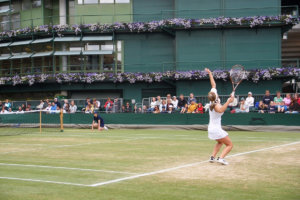What to do when you’re not playing well
posted on: October 27, 2016
author: Brian Lomax, Ed.D.

A short story from a practice match I played recently…
The wind was in my face and I was getting ready to serve for the first time in the match. I don’t have a very big serve and even a little bit of wind against me can make it more ordinary than usual. My opponent was an aggressive returner who often liked to follow his shots into the net, and while I don’t mind that so much, I’m typically looking to grind out points from the baseline. That’s my comfort zone. Based on those factors, I was feeling some pressure to do “something” with my first serve. Naturally, the first one went straight into the net. Uh oh.
But hold on a second. After that first serve went into the net, I became very aware of what went wrong. I rushed through my entire service ritual and motion, starting with bouncing the ball way too fast. That rushing lead to my toss being too low and too far in front. My muscles were tense and the entire service motion was anything but fluid. How could I possibly expect my serve to go in with all of this going on?
This realization took about 1 second and it helped me make the adjustments I needed. I took a deep breath and lowered my shoulders on the exhale. I bounced up and down, and shook the tension out of my right arm. In my service ritual, I bounced the ball slowly, and stayed slow and smooth throughout the entire motion. I didn’t care if my opponent was coming into the net or not. The result was that I served well for the rest of the match.
In working with students on their mental game, this is a story that I rarely hear. Based on the first paragraph above, the usual story would be “I didn’t serve well today.” And that story leads to a loss of confidence and a poor performance. If adjustments were made, they were all technical in nature and didn’t result in much improvement. There was no awareness of body and mind.
Through practices such as yoga, meditation, and rhythmic breathing, I have become much better at being aware of how I feel when I compete. My mind and body communicate much better than in the past. This is important because regardless of your sport, if you are making mistakes, it’s most likely due to tension in your muscles which is leading to mechanical breakdowns and rushing. To start playing well, you need to be aware of how you are feeling and know what to do about it.
Many students ask me “what should I do when I’m not playing well?” It’s a great question and it is the right question. We have to DO something. My answer to this question normally begins with “Well, you’re not going to like my answer…” And I start off with that because I know most players don’t want to focus on doing the activities that I mentioned in the story above. They don’t believe that breathing, body language, and body awareness are important factors to performing well. They feel that everything is about technique. However, being aware of your body and mind is critical and that’s where you must start.
To play well, you must feel well. Your body and mind must be in harmony. When your are not playing well, all of your actions and adjustments should be about changing how you feel. From there, you’re technique will improve. Here’s a quick list of things to do:
- Take deep and rhythmic breaths
- Lower your shoulders on the exhale
- Bounce up and down, and shake out your arms and legs
- Walk with confidence and determination – shoulders back, positive energy, a bit of swagger
- Take more time between points (for other sports, look to slow the pace of the game down)
- Slow down your mechanics with an aim to be smooth – that doesn’t mean decelerate through the motion; just go slow so you can establish a rhythm
- Loosen the grip on your racquet (or stick, ball, etc.) – a lot of tension begins with how tightly we hold the racquet
- Be patient with the process of making yourself feel better
If you do the above consistently in your performance, you’ll start to feel more in control of yourself and your body and mind will be in harmony. After you have achieved a state of feeling better, it will be easier to make more complex adjustments if they are needed. Your mind will also be better prepared to handle whatever pressures may have been contributing to the tension you were feeling.
I recommend that you write the items above on a piece of paper and bring it onto the court with you. Read it before you play and on change-overs. Use this checklist from the start of the match and you probably will not have to ask the question, “what do I do when I’m not playing well?”
About the Author
Dr. Brian Lomax founded PerformanceXtra™ in 2009 with a mission of helping athletes achieve their goals and their top performances more consistently through a progression of mental skills that enables them to focus on what is truly important.
Learn more about the author: https://performancextra.com/brian-lomax/

Hi nice article thanks. i didn’t play well today at practice and i was very upset the entire day until now. i now learned from this experience that next time i will do these things instead of freaking out and losing my mind like today. I also learned that playing bad is an oppurtunity to do these right things. thank you brian.